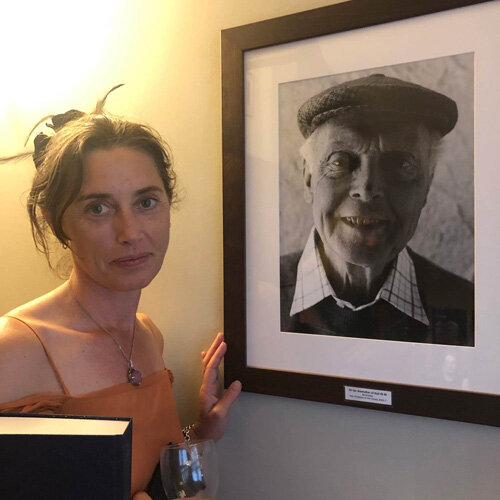Article for Women Writers
With my father at the London Library
My father was sold by his mother to his aunt for £500. This shocking truth, which came to form the backbone of A Perfect Explanation, was something I’d known all my life. I don’t remember learning it – so casually was it known in the family that its existence was not something of drama.
It was a fact which we passed around, and passed over as if talking about the weather, and it was only in the process of writing and publishing this novel, that I’ve come to understand the trauma buried deep within its simple arrangement of words.
The context; some of which I knew, and some of which I uncovered during my research, was this: my grandmother, Enid Campbell, was the granddaughter of the 8th Duke of Argyll. Her mother’s estate, married to her father’s title, formed an inheritance due to land on the shoulders of her brother, Ivar. But like so many of his generation, he lost his life in Gallipoli in 1916, and the burden of replacing him as heir, fell to Enid who, unlike her sister Joan, was married.
The fact that she was unhappily married to a man she’d said yes to out of spite, that she was planning to leave him and right the ship that was listing badly, it was how she was going to get her life back were of an irrelevance to her mother, as was Enid’s absolute abhorrence of becoming a mother herself. She had no wish to be part of either institution; she wanted to be a nun, or a poet, she wanted to be free like her sister Joan, but their mother had marched her words relentlessly over their grief, the brown paper wedged beneath her knuckles. “Ours is a substantial fortune. You,” and she’d pointed at Enid, “must replace him.”
This was a common occurrence. Lost heirs must be replaced, and replaced by another boy despite the existence of living, healthy sisters. It went unquestioned, as did the tenet that all women want to be mothers. Enid was cast, unwilling, into this role, and the consequences were devastating.
Like many writers, I find it hard to remember the birth of this novel in my mind. Like the fact of my father’s sale to his mother, A Perfect Explanation feels as if it was always there, appearing in my life without drama, but if I were to source it to one early idea, it would be the moment it occurred to me that I didn’t know my grandmother’s name. So dominant was Aunt Joan in his life and our childhood, that, more specifically, it hadn’t occurred to me that my father had a mother at all until it crossed my mind one day that of course, he must have done, and I had no idea what she was called.
This if, any, was the birthplace, the starting point, of two years of research and a decade writing. I remember asking him, and I remember the shock of a whole, hidden world opening up on hearing him say Enid. It was then, that I knew there was a story there, and I wanted to tell it.
What I uncovered was a tale of prejudice, miscommunication and neglect. My father gave me complete, unfettered access to his past – I’m glad to say, he wanted it told. This – that writing a story of a painful history brings a healing of sorts – was one of the lessons made plain to me.
He was a private, solitary man, yet he opened up, and opened the archive up without a moment’s hesitation, and though he died within a year of my writing the first draft, I like to think he died with a lighter heart. Being heard is a gift we can give each other, and not only did I have the privilege of hearing him, but found that the same could be done for those long dead. This, that ancestors will continue to speak their pain long after their bodies are buried, and that pain continues to reverberate down the generations, was another great lesson learnt in the writing of this novel.
It is no exaggeration to say that for the decade of writing, my ancestors – Joan & Enid, and their mother Sybil – crowded my studio, shouting out their version of the truth. Each was determined to give their perfect explanation, to be heard. It took a decade to hear them out, a decade to unmask where bias took the guise of facts, and shame the face of I had no choice.
There is always choice, but only time and space reveal where ignorance, habit and tradition take precedence over empathy. These were wealthy, privileged people, emotionally undernourished and bound by the lores of the society in which they lived Yet there were no heroes and villains, only people misunderstood. They each suffered, they each regretted, they each lacked the voice to make amends.
My family, as I am often asked, have weathered it well. It is unsettling to read a fictionalised account, using real names, of a shared true story set in the stone of a published novel. This version is the version that will live on, and I’m keen to remind others who are writing family stories to remember that we writers have time to get used to it, while our families must swallow the finished product whole, and in one bite. I’ve learnt to be more gentle around their misgivings, and more allowing of their shock. This, my novel, is only my perfect explanation. For each person connected to a story, there will always be another perfect explanation of their own.
Originally published on Women Writers >
